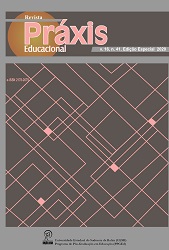THE LOGIC OF THE MARKET AND THE WORKING WORLD IN THE ENGINEER TRAINING
DOI:
https://doi.org/10.22481/praxisedu.v16i41.7261Abstract
The expansion of higher education, especially in the 90s, generated the diversification of institutional formats and academic modalities, deriving from this process regulatory policies based on the transnationalization model of Higher Education. Thus, understanding the local panorama, with properties intensely intertwined with the action of globalization and with the determinations coming from multilateral international organizations, the objective of this study was to analyze the formative perspective of UEAP Engineering Courses (Production, Fishing, Environmental, Forestry and Chemistry). Theoretical-methodological aspects are established on the basis of Bakhtin's Historical- Dialectical Materialism and Discourse Analysis. The research was documentary based on the Pedagogical Projects of the Courses (PPCs), Reports of the Evaluation Committee and the institution's home page. It was found that the Local Productive Arrangements (APLs) are admitted in the documents as guiding axes of the PPCs, as well as the Amapá Produtivo Plan, integrating to them, the value of the course design, reinforcing the commercial logic as a background in the elaboration of the central pedagogical documents of the courses. The results strongly mark the formation of engineers that aims to meet the demands of the market, with a formative bias for entrepreneurship.
Downloads
Downloads
Published
Issue
Section
License

This work is licensed under a Creative Commons Attribution-ShareAlike 4.0 International License.












